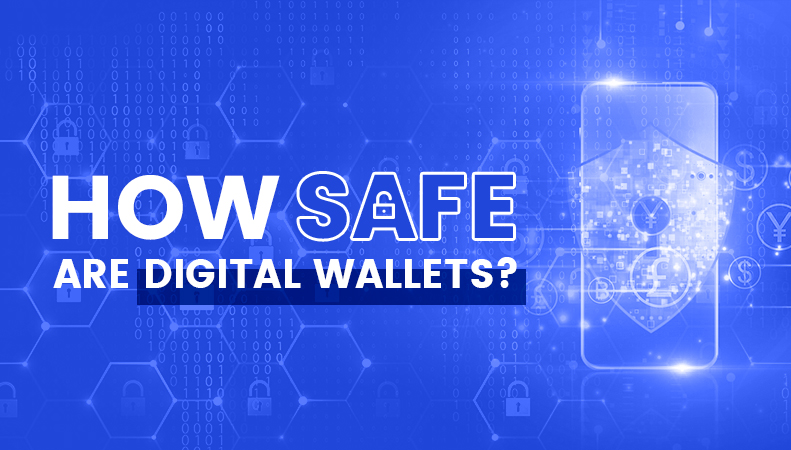
HOW SAFE ARE DIGITAL WALLETS?
12th August 2022
When individuals say they have a wallet, they might usually mean a location to keep their cash and credit cards physically. However, instead of using traditional physical wallets, you can now utilise contactless digital wallets, which have risen in popularity throughout the COVID-19 pandemic. The choices of e-wallets Malaysia has to offer are now plentiful. You can safely and securely perform financial transactions with only a quick scan or a tap because digital wallets allow you to pay without using your physical credit cards. Any device that stores information connected to financial transactions via an app is referred to as a "digital wallet". Smartphones, wearables such as smartwatches, tablets, and laptops are just some of these devices.
A digital wallet maintains your payment information in an app so you can make purchases electronically, whether in a real store or online, using your computer, smartphone, watch, or other smart devices.
You may be asked to enter a passcode or password, utilise your device's facial recognition software, or authenticate with your fingerprint to complete the transaction. This security feature also ensures that you are the one making purchases, paying someone directly, or booking a ticket on your phone. You may be required to log in or provide a password if you are using a non-mobile digital wallet, such as your laptop. There's no need to get out your plastic card and fill in a bunch of information. This speeds up and simplifies the checkout process.
What Is The Purpose Of A Digital Wallet?
- A digital wallet securely keeps all of a user's payment information in a small amount of space.
- A business that needs to acquire user data (such as data on purchasing habits) may find digital wallets very useful. However, this could lead to decreased purchasing privacy.
- Developing countries may be able to level up their involvement in the global financial sector by embracing digital wallets.
- Friends and relatives can receive and send money to users in distant countries with little to no effort.
- Digital wallets also eliminate the necessity for real banks and businesses to open and maintain bank accounts. As a result, they connect people and companies in rural locations.
- To make cryptocurrency transactions and keep track of balances, you'll need a digital wallet.
Contactless Payments Are Part Of Our Lives
Our debit and credit cards are used for many of our daily transactions, such as groceries, gas, dining out, and entertainment. Cards have already surpassed cash as the preferred method of payment. During the pandemic, most businesses made it even easier for customers to swipe their cards and avoid touching cash that had travelled along so many hands.
Contactless payment systems are frequently used to boost throughput at public transportation gates, road tolls, and parking garage checkout terminals. Even if the time saved for every transaction is only a few seconds, the minutes saved can add up to significantly reduce the number of times consumers spend waiting in queues. Even if COVID-19 limits are eased, the development of contactless technologies is expected to continue to blossom and accelerate. Soon, all you'll have in your pocket is your smartphone, with the ability to buy anything you want with it.
Over the last few years, mobile commerce has grown at an astounding rate. This should come as no surprise, given that mobile devices account for more than half of all web traffic worldwide. As a result, mobile devices have had a huge impact on modern buying habits. And there are breakthroughs like the digital wallet, which has fundamentally transformed the customer experience. They're simple to use, secure, and convenient, and they're a more sanitary way to pay.
Is It Common To Use A Digital Wallet?
According to research, 32% of consumers who use mobile wallets have three or more e-wallets on their smartphones. This percentage was only 21% a year ago. Some Millennials claim to have nine digital wallets on their smartphones. One of the most significant drivers of this trend has been the pandemic. COVID-19 required social isolation and the avoidance of cash purchases at stores. Technological advancements and high-speed internet have enabled the smooth hosting and operation of various payment instruments.
A digital wallet may contain information from many cards. Loyalty cards, discount vouchers, tickets, and other items can be saved in a customer’s digital wallets. Digital wallets are becoming increasingly popular as more customers turn to buying online, with customers appreciating the convenience of digital wallets. These wallets handle one of the most important issues for most consumers: security, using encryption, tokenization, and user authentication. Most customers believe that using a digital wallet is safer than carrying cash or traditional cards. Digital wallets serve as a one-stop shop for all of your transactions. It enables users to keep track of their previous costs as well as plan for future ones.
What Are The Potential Risks Of Using A Digital Wallet?
1. Losing Your Phone Is Like Losing Your Credit Card
Your smartphone is a little, slick device that gives you access to your personal life. The names and contact information
of every important friend in a person's life, as well as their photo collection and social networking apps, are all
stored on a normal iPhone or Samsung Galaxy. It can also enable credit and bank account access through a mobile wallet
and payment apps.
One big downside? If you drop your phone in a restaurant or leave it at an airport charging station without realising it, it's up for grabs by anyone who would rather interrupt your life than return your lost goods.
What To Do: Most smartphones have built-in security features that can prevent a phone thief from racking up fraudulent charges using your mobile wallet. The easiest approach to keep a thief out of your phone is to require two-factor authentication, ideally, a PIN combined with a biometric method like your fingerprint, facial recognition, or an iris scan.
Due to privacy concerns, some users are hesitant to utilise biometric authentication. The major mobile operating systems, on the other hand, have safeguards in place to secure biometric information. Apple's Touch ID function, for example, employs a mathematical model of your fingerprint rather than the actual print. Many modern smartphones, such as Samsung Knox, contain security-grade storage systems.
2. Cyberthieves Can 'Spoof' Your Mobile Wallet
When you add a credit or debit card to your mobile wallet, it is encrypted, which hides the card number behind a code
generated by an algorithm. Furthermore, when you make a purchase, the major mobile wallet providers utilise randomly
generated payment tokens to ensure that your card information is not viewed by merchants or even the wallet providers.
If you add cards to your mobile wallet while using an open public Wi-Fi network, the danger of a cybercriminal stealing your account numbers is minor. Hackers lurking on such networks, according to Clyde, can re-create, or "spoof," a mobile wallet's registration system, which requires you to submit your card info.
What To Do: Use your own password-protected Wi-Fi network at home to load your card details into your mobile wallet. Consider setting up a personal virtual private network (VPN) for your phone if you need to handle your mobile wallet while away from home.
3. Your Phone Can Become Infected With Malware
Malware is used by cyber criminals to remotely control computers, smartphones, and other devices, as well as steal passwords
and other personal information. Malware infection is most commonly caused by an unwary user clicking on a shady ad or a bogus
link delivered by a hostile third party
Although computers are more vulnerable than cell phones, mobile malware is becoming more prevalent. McAfee, a cybersecurity firm, revealed in April that the number of mobile malware samples had increased year over year in 2016. Mobile malware is becoming increasingly common, and some of it is extremely harmful.
What To Do: Use your own password-protected Wi-Fi network at home to load your card details into your mobile wallet. What to do: When it comes to malware, smartphones are often safer than desktops. A bank or card issuer can use security protections on its payment or banking app, but it can't control third-party browsers where many clients manage their online accounts. Nevertheless, stay away from clicking on links in questionable ads, emails, or text messages from unknown sources. As an added precaution, install anti-virus software on your phone.
How Can Digital Wallets Be Made More Secure?
1. Set A Unique Passcode
Always use a passcode to secure your digital wallet. This can be an effective and simple way to deter cybercriminals. It's
best if this combination of numbers isn't the same as your phone's passcode. Also, make certain that the numbers are chosen at
random. Birthdays, anniversaries, addresses, and the last four digits of your phone number are all common combinations that a
determined criminal may crack.
Set up facial recognition or a fingerprint scan to protect your account if your mobile wallet software permits it. If accessing your digital wallet proves difficult or impossible, a cybercriminal may move on to a less challenging target, keeping your personal information safe.
2. Update Software Regularly
Another strategy to keep your digital wallet safe is to make sure you have the most recent software upgrades installed.
Because developers are continuously discovering and addressing security flaws, the most recent software is frequently the
most secure. To ensure that you never miss a new release, enable automatic updates.
3. Download Digital Wallet Apps Directly From Official Websites
Before you ditch your plastic cards in favour of digital payment methods, do some research on the digital banking app.
Ensure that any app you download comes from the official Apple or Android store, as well as the banking institution's
website. Then, to make sure you're not downloading an imposter, look at the number of downloads and reviews the programme
has. While the majority of programmes available in official stores are authentic, it's always a good idea to double-check
for typos, fuzzy logos, and amateurish app descriptions.
EVOLET is a digital wallet app for migrant workers.
Learn more at https://evolet.io/
